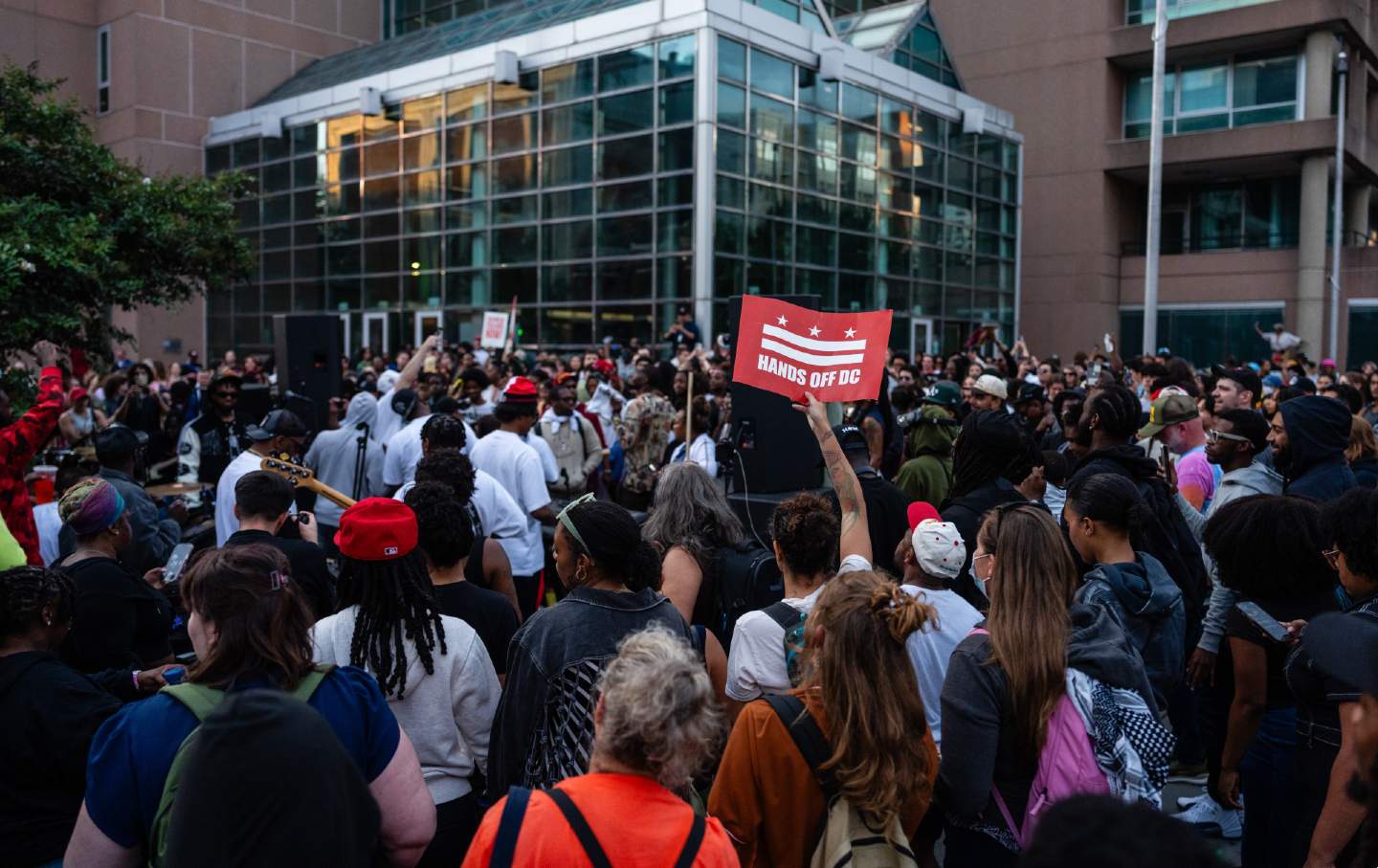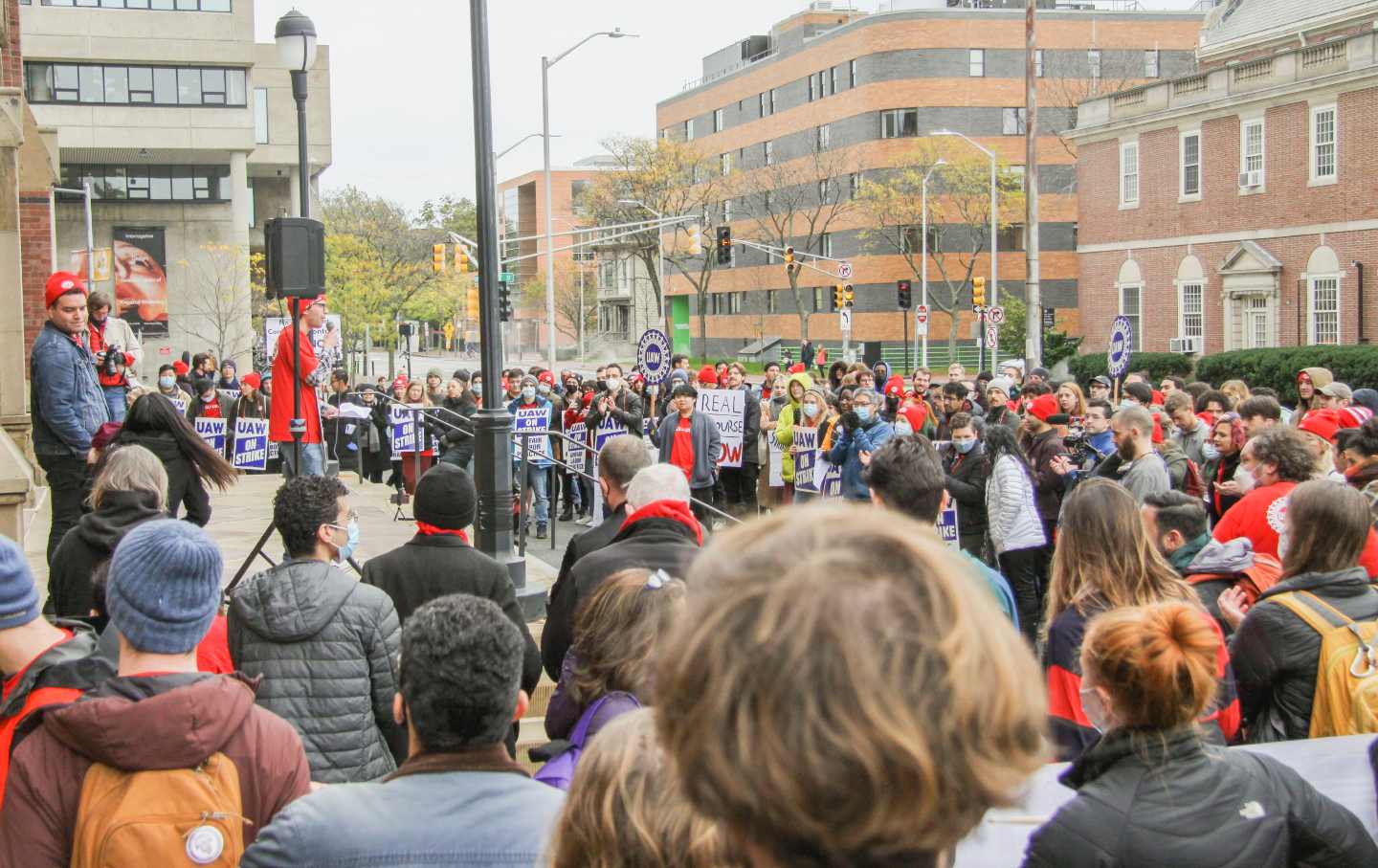The Supreme Court’s Birthright Citizenship Ruling Is a 5-Alarm Catastrophe
In Trump v. CASA, the court hands the president yet more unaccountable authority—and yanks us into a neo-Confederate legal nightmare.

Supreme Court Justices Brett Kavanaugh and Amy Coney Barrett greet President Donald Trump after his address to a joint session of Congress on Tuesday, March 4, 2025.
(Tom Williams / CQ-Roll Call, Inc via Getty Images)The legal upshot of the Supreme Court’s monumentally disastrous decision in Trump v. CASA (more commonly known as “the birthright citizenship case”) is chaos. Utter legal chaos. In its ruling on Friday, the court’s usual six monarchists granted Donald Trump’s request to reexamine various nationwide injunctions preventing Trump and Stephen Miller from implementing their plans to revoke birthright citizenship to any American who doesn’t happen to be white. With the legal sleight of hand so beloved by the Roberts court, the ruling doesn’t actually allow Trump to end birthright citizenship. It just makes it incredibly difficult for courts to stop him from ending birthright citizenship. It’s a distinction, one that lawyers will try to exploit for an entire rearguard action to defend citizenship in this country, but one that’s unlikely to make much of a difference if you happen to be born on the Republican side of the tracks. Once you read the fine print, it becomes clear that this decision is a historic, five-alarm catastrophe.
For those unfamiliar with this specific kind of court order, let me define some terms. An injunction is an order issued by the court preventing the government from doing a thing. Before today, lower courts had the authority to prevent the government from doing an unconstitutional thing, not just in the jurisdiction where the court sits, but nationally.
I’m not actually a fan of nationwide injunctions. The system can be incredibly politicized. Republican judges use nationwide injunctions all the time to stymie the agenda of Democratic presidents. Democratic judges use nationwide injunctions to slow down the Trump administration. Whether a president gets to have their agenda often depends on whether the opposition party can find a friendly lower-court judge.
However, though flawed, nationwide injunctions make sense when it comes to national issues involving civil and human rights: issues like, say, the Constitution’s very clearly stated definition of national citizenship. After all, one’s fundamental rights should not wildly change if they miss their exit on the interstate.
In one fell swoop, the Supreme Court has thrown that system into the shredder. Trump v. CASA takes away the ability of lower-court judges to issue nationwide injunctions. Instead, lower courts are now limited to issuing rulings that apply only to the litigants who happen to be before them in their local court. Injunctions now must be narrowly tailored to give the active litigants only what they personally need, and nothing more. In other words, if Trump violates my constitutional rights in New York, I can sue and potentially win. But if Trump violates your constitutional rights in exactly the same way in New Jersey, you have to sue for yourself. Indeed, the ruling probably means that if Trump violates your constitutional rights in exactly the same way in New York, you have to bring a separate lawsuit in New York to defend your constitutional rights. Every person has to individually ask for their constitutional rights. It’s everyone for themselves, according to the Supreme Court. Everybody needs to lawyer up.
The decision means that some courts, districts, and states will still defend the concept of birthright citizenship, while others will not. That could mean that whether or not a child born in America on or after June 27, 2025, is considered a citizen of the United States will depend on what state, or even county, that child happens to be born in.
If that setup sounds familiar, it should. It is exactly how this country determined citizenship from June 21, 1788, (when the Constitution was ratified) until July 9, 1868 (when the 14th Amendment was ratified). The idea that citizenship depends on which state recognizes your citizenship has literally been tried before in this country, with Black people and Native Americans having citizenship rights in some states and… not in others. We have already fought over this. It was called the Civil War. We resolved this issue; it’s called the first section of the 14th Amendment. We have tried doing citizenship the Confederate way and realized it was an error.
But that antebellum, neo-Confederate structure is what the Supreme Court brings back to us today. It’s fashionable to say that the court’s ruling is not really about birthright citizenship, because the legal question focused on the power to issue nationwide injunctions. But that sanewashing of the court’s opinion does not survive its first contact with reality. By taking away the ability of courts to enter nationwide injunctions in this case, the court is giving Trump carte blanche to violate the constitutional definition of citizenship in any district where a friendly Trump judge will allow him to. And, in practice, this ruling will extend to every other single issue where Trump has been stopped thanks to a nationwide injunction. Right on cue, Trump signaled today that he intends to move ahead with a slew of agenda items “that have been wrongly enjoined on a nationwide basis,” including policies targeting trans children, refugees, immigrants, and, yes, birthright citizenship.
Nationwide injunctions have been a thing for a long time. The court could have addressed the issue in a myriad of other cases (including, you know, any where the Biden administration was subjected to a nationwide injunction). They chose to do so here, on this issue, where lifting the nationwide injunction will have the direct and immediate impact of letting Trump and Miller take away citizenship on a case-by-case basis. If ever there was a reason to have a nationwide injunction, it would be a situation where a president brazenly refuses to follow the most important amendment ever inserted into the Constitution. This opinion is about birthright citizenship, and more broadly about letting Trump yank us back to the 1850s without hindrance; claiming it’s only about nationwide injunctions is like claiming that the tail wags the dog.
To get to the point where she can return us to the state-by-state determination of citizenship practiced during the enslaver period of this country, Justice Amy Coney Barrett, who wrote the majority opinion for the Republicans, argues that nationwide injunctions should never be a thing. Her principal reasoning for this is… the High Court of Chancery in England, which existed at the time of the adoption of the Constitution. I wish I were making that up, but I’m not nearly creative enough to do it. Barrett, and the rest of her Republican colleagues, determined that nationwide injunctions cannot be used in 2025 to stop a president from violating the Constitution of the United States, because the High Court in England—which existed during a time of hereditary monarchy—did not use a historical equivalent of a nationwide injunction to enforce the laws against [checks notes] their King.
Originalism often leads to ludicrous arguments, but this one really takes the cake. Or crumpet, as it were. We’re living in a world where six Republican Supreme Court justices used the courts of a monarchy we revolted against as the controlling authority on whether the president of the United States has to follow the Constitution.
And Barrett doesn’t stop there. She isn’t sure that any American court can make Trump follow the law. (It’s unclear if she thinks an English court could do it.) She writes: “No one disputes that the Executive has a duty to follow the law. But the Judiciary does not have unbridled authority to enforce this obligation—in fact, sometimes the law prohibits the Judiciary from doing so.”
According to Barrett, the law is a mere suggestion to Donald Trump. She hopes he follows it, but if he doesn’t, there might be nothing the courts can do. I’ve said repeatedly that the courts will not save us from Trump, and will not require him to follow the law. Perhaps I should thank Barrett for so shamefully proving my point.
On the face of this decision, every case against the Trump administration’s attempt to end birthright citizenship now has to be relitigated, at least in part, with the parties trying to secure a more limited injunction that applies to only them, or a class of citizens they go back to the drawing board to form. Every state will now have to sue the Trump administration individually to defend the constitutional grant of citizenship, and Trump is now probably free to end birthright citizenship in states that do not sue.
More broadly, many of the legal fights brought against Trump over these first few months of his fascist reign are now moot and will have to be relitigated. And even if there is a “win” against the Trump administration, that win will be limited to the litigants actually involved.
Again, as a technical matter, this will result in utter chaos, even for litigants who win. Imagine trying to explain to Trump’s gestapo forces that you are a winning litigant and Trump’s attempts to deport you without due process are void as applied to you personally, but not the other eight people you’re sitting with in an ICE detention van. Imagine trying to convince a state official in Texas that your baby should get a birth certificate, because you were a part of a successful lawsuit, but the official can still deny birth certificates to children in the next ward because their mothers did not sue in a timely manner. Imagine having your constitutional rights depend on whether or not you responded to an e-mail from a lawyer trying to generate a class-action. After today, your access to your constitutional rights could be sitting in your spam folder.
In a concurrence to the ruling, alleged attempted rapist Brett Kavanaugh assures us that all will be well. While the decision took away the ability of lower courts to stop Trump’s attempts to end birthright citizenship, Kavanaugh says that the Supreme Court has reserved that right for itself. Eventually, Kavanaugh tells us, all of the disparate case-by-case, county-by-county citizenship cases will make their way to the Supreme Court, where Kavanaugh and his buddies can finally rule on the constitutional merits of Trump’s actions. And Kavanaugh promises us that the Supreme Court will act quickly to resolve the (utter freaking) chaos the Supreme Court has itself introduced into the system.
Popular
“swipe left below to view more authors”Swipe →Kavanaugh has made these wild promises before. In Dobbs v. Jackson Women’s Health, Kavanaugh assured us that the Supreme Court’s repudiation of Roe v. Wade would take the abortion issue out of the courts. Time has proven him wrong. But I find myself in the weird and unenviable position of hoping that, this time, the dumbest justice on the Supreme Court in my estimation is right. It’s definitely possible that, once the Supreme Court gets back from its summer vacation, and after countless birthright citizenship lawsuits have been filed and resolved on facially conflicting grounds, the Supreme Court will decide to tell us whether the 14th Amendment is still good law.
Of course, the last time the Supreme Court decided to “resolve” the citizenship question in the United States, the outcome was the Dred Scott decision, the ruling was that a Black man had no rights the white man was bound to respect, and the result was a civil war. Allowing states and localities to determine for themselves who really gets to be a US citizen, even for a short time, can have obvious, disastrous consequences. Once the Pandora’s box of two-tiered citizenship is opened, it will be really hard for the Supreme Court to recapture all of the horrors it unleashes. Or, as Justice Ketanji Brown Jackson puts it in her chilling dissent, “Eventually, executive power will become completely uncontainable, and our beloved constitutional Republic will be no more.”
For a long time now, the Republicans on the Supreme Court have been trying to relitigate the 20th century and destroy all of the progress made during the Civil Rights era. But that is old news. That’s a pre-Dobbs analysis and frame. The Republicans on the court have won their battle against the 20th century and have moved on.
They’re now trying to relitigate the 19th century and destroy all of the progress made during the Reconstruction era. And right now, they’re winning their second Civil War, without firing a shot.
Take a stand against Trump and support The Nation!
In this moment of crisis, we need a unified, progressive opposition to Donald Trump.
We’re starting to see one take shape in the streets and at ballot boxes across the country: from New York City mayoral candidate Zohran Mamdani’s campaign focused on affordability, to communities protecting their neighbors from ICE, to the senators opposing arms shipments to Israel.
The Democratic Party has an urgent choice to make: Will it embrace a politics that is principled and popular, or will it continue to insist on losing elections with the out-of-touch elites and consultants that got us here?
At The Nation, we know which side we’re on. Every day, we make the case for a more democratic and equal world by championing progressive leaders, lifting up movements fighting for justice, and exposing the oligarchs and corporations profiting at the expense of us all. Our independent journalism informs and empowers progressives across the country and helps bring this politics to new readers ready to join the fight.
We need your help to continue this work. Will you donate to support The Nation’s independent journalism? Every contribution goes to our award-winning reporting, analysis, and commentary.
Thank you for helping us take on Trump and build the just society we know is possible.
Sincerely,
Bhaskar Sunkara
President, The Nation
More from The Nation

Letter From DC: Goodbye to John Wall, Hello to Celebrating His Rebel Spirit Letter From DC: Goodbye to John Wall, Hello to Celebrating His Rebel Spirit
The former Washington Wizards point guard retires from the NBA, but the anti-Trump protests embody his swaggy defiance.

A Losing “Argument” A Losing “Argument”
The buzzy new publication devoted to “libbing out” reprises the mistakes of the longstanding alliance between neoliberalism and Beltway journalism.

Trump’s War on Higher Ed Comes to the Bargaining Table Trump’s War on Higher Ed Comes to the Bargaining Table
As two of the nation’s largest private graduate student unions fight for new contracts, their members have been among the most vulnerable to the president’s attacks on universitie...

I Went to the “Free Press” Party for Under-30s. All I Got Was Ennui. I Went to the “Free Press” Party for Under-30s. All I Got Was Ennui.
At Bari Weiss’s “Cheers to the Republic” mixer, I met anti-vaxxers, was recruited for a trip to Israel, and heard the word “heterodox” more than I would have liked to.

MAGA Conservatives Are Terrified of the Future MAGA Conservatives Are Terrified of the Future
Trump and his followers don’t just want to halt progress. They want to turn back the clock.

As Federal Support Wanes, States Must Reinvest in Higher Education As Federal Support Wanes, States Must Reinvest in Higher Education
Our education system faces a crisis of affordability and access only amplified by the passage of the Big, Beautiful Bill and Trump’s attempted cuts. States need to step up.


